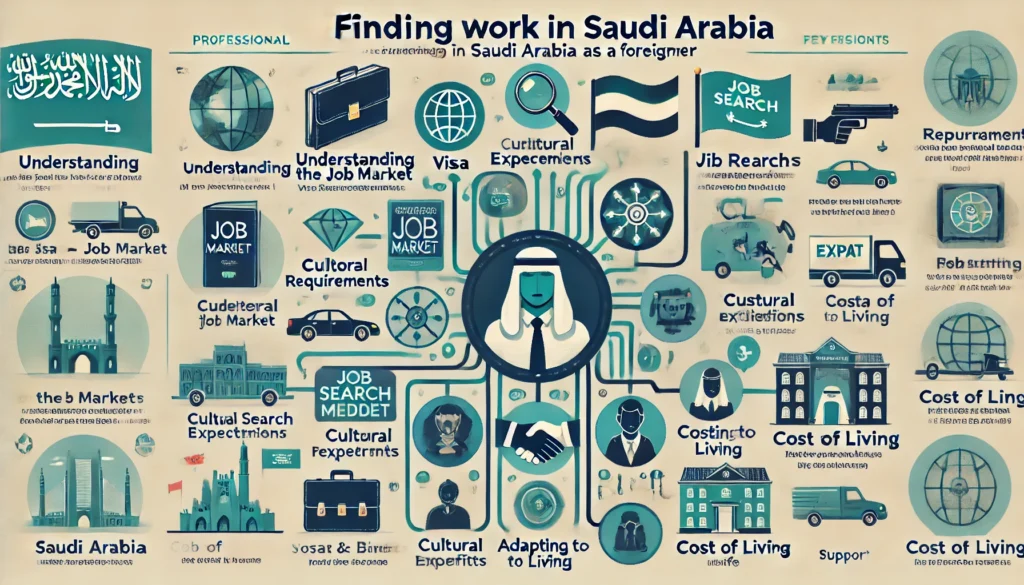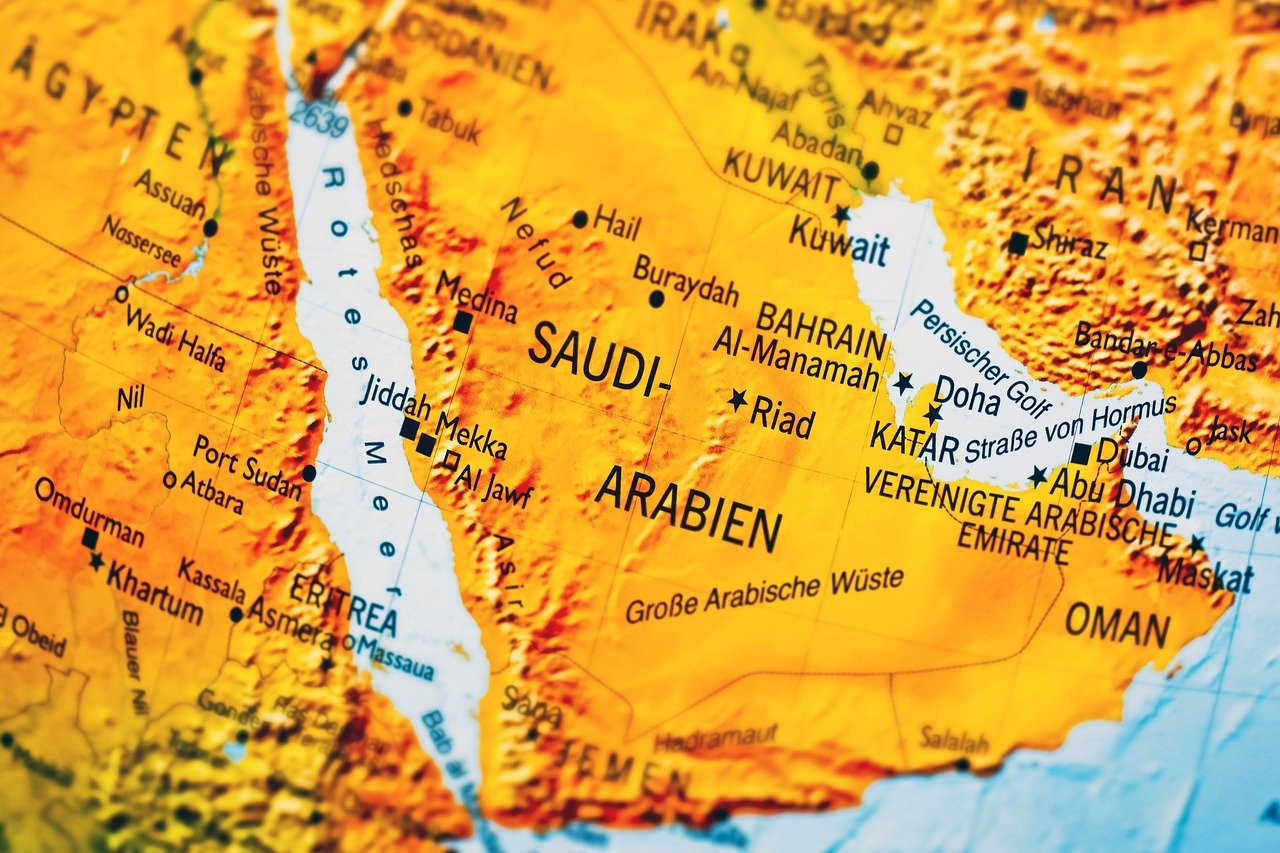Saudi Arabia, known for its vast economic growth and development, offers a dynamic job market with opportunities for skilled and unskilled workers alike. Attracting foreign talent for decades, Saudi Arabia continues to be a popular destination for foreigners seeking employment. However, navigating the Saudi job market can be challenging, especially with unique cultural expectations, work visa requirements, and sector-specific demands. This article provides an in-depth guide for foreigners looking to secure employment in Saudi Arabia.
1. Understanding the Job Market in Saudi Arabia

Saudi Arabia’s economy heavily relies on oil production, but recent initiatives have diversified the economy, opening up more opportunities in sectors such as healthcare, information technology, construction, hospitality, education, and engineering. The government’s Vision 2030 plan focuses on reducing dependency on oil and expanding industries like tourism, entertainment, and renewable energy, thus creating new roles in these fields.
- Key Sectors for Foreign Workers: Traditionally, the construction, oil, and gas sectors have employed a large number of foreign workers. Today, sectors such as healthcare, finance, technology, and education are also in demand, as the country strives to build a skilled workforce in diverse fields.
- Demand for Specialized Skills: Roles in IT, engineering, finance, project management, healthcare, and education require highly skilled workers. Employers often seek foreigners with qualifications and experience that meet Saudi Arabian standards and fill gaps not covered by the local workforce.
2. Requirements for Foreign Workers
Before starting your job search, it’s crucial to understand Saudi Arabia’s work visa requirements and employment regulations.
- Visa Requirements: Foreign workers must obtain a work visa (Iqama) sponsored by their employer. This permit is issued after the employment contract is confirmed and typically requires a medical examination, background checks, and degree verification. It is illegal to work in Saudi Arabia on a visitor or tourist visa.
- Degree and Skill Verification: Most jobs require proof of education or technical skills. The Saudi Ministry of Labor mandates degree attestation for certain roles, which involves verifying your degree through your country’s embassy or consulate in Saudi Arabia.
- Age Limits and Nationality Restrictions: Saudi Arabia has age limits for certain professions, typically between 22 and 60 years. Some roles may have restrictions on certain nationalities due to labor laws.
3. Navigating Cultural Expectations

Understanding Saudi Arabian workplace culture is essential for building strong relationships and succeeding in your role.
- Workplace Etiquette: Saudi workplaces are often formal, with expectations for politeness, respect, and professionalism. It’s common to greet coworkers with a handshake, avoid discussing personal matters, and dress conservatively.
- Gender Segregation: Many workplaces in Saudi Arabia observe gender segregation, meaning separate areas or floors for men and women. This policy applies more strictly in government offices and traditional companies but may be relaxed in multinational or progressive firms.
- Islamic Practices and Observances: Employers in Saudi Arabia expect foreign workers to respect local customs, especially during religious practices and observances like daily prayers and Ramadan. It’s advisable to follow workplace norms related to prayer times and avoid eating or drinking in public during fasting hours in Ramadan.
4. How to find work in Saudi Arabia ?
A. Best Website To Find Jobs In Saudi Arabia
Many companies post job vacancies on online portals, where foreigners can apply directly. Some best website to find jobs in Saudi Arabia include:
- Bayt.com – One of the largest job portals in the Middle East, widely used by multinational companies.
- Naukrigulf.com – Offers listings across various sectors, including engineering, healthcare, and finance.
- GulfTalent.com – Specialized in job listings for Gulf countries, this platform is popular among expats.
- LinkedIn – Allows for networking with recruiters and connecting with professionals in the Saudi job market.
B. Recruitment Agencies
Working with recruitment agencies specializing in placing foreigners in Saudi Arabia can streamline the process. Agencies handle visa applications, interviews, and placement. Some recommended recruitment agencies include:
- Hays Middle East – Covers sectors like IT, finance, and construction.
- Michael Page – Known for recruiting professionals in engineering, healthcare, and banking.
- Gulf Connexions – Focuses on executive-level positions in various industries.
C. Networking and Referrals
Networking is highly valued in the Saudi job market, and referrals can boost your chances of securing a job. Join LinkedIn groups and attend webinars to connect with professionals in your field. Many multinational companies also have branches or partnerships in Saudi Arabia, so reaching out to your global network may lead to job opportunities.
5. Preparing for the Application Process
Saudi employers prioritize experience, technical skills, and sometimes proficiency in Arabic. Here’s how to tailor your application:
- Resume and Cover Letter: Ensure that your resume is concise and highlights relevant experience. Saudi employers may prefer chronological resumes over functional ones. Your cover letter should be respectful, mentioning your interest in the Saudi work culture and commitment to adhering to local regulations.
- Interview Preparation: Interviews often emphasize your professional qualifications and ability to adapt to a new culture. Saudi interviewers may ask about your experience with international work environments, so be prepared to discuss how you’ll contribute to the company’s goals while respecting the local culture.
6. Key Considerations for Foreign Workers
A. Salary and Benefits
Salary packages in Saudi Arabia vary depending on the company, industry, and your qualifications. Common benefits for foreign workers include housing allowances, health insurance, and transport allowances. Saudi Arabia has no income tax on individual earnings, making it an attractive destination for many expatriates.
B. Accommodation and Cost of Living
Many employers provide housing or housing allowances, as accommodation can be costly in major cities like Riyadh, Jeddah, and Al Khobar. The cost of living in Saudi Arabia can vary based on your location, lifestyle, and family size. Healthcare is usually provided through employer insurance, but additional coverage might be required for dependents.
C. Education for Dependents
For foreigners moving with families, access to quality education is an essential consideration. Saudi Arabia has several international schools offering curricula in English, but the fees can be high. Some companies offer education allowances as part of their expatriate packages.
7. Adapting to Life in Saudi Arabia
Saudi Arabia offers a unique lifestyle that combines modern amenities with deeply rooted traditions. Understanding and respecting the country’s laws and customs is key to a smooth experience.
- Local Laws: Foreigners are expected to comply with local laws, including dress codes and behavior in public spaces. It’s important to be aware of restrictions on alcohol and adhere to gender segregation policies in certain areas.
- Social Life and Entertainment: Major cities have many entertainment options, including malls, restaurants, and recreational activities. Saudi Arabia has also recently expanded its cultural and entertainment options, with cinemas, concerts, and sports events becoming more common.
- Learning Arabic: While English is widely spoken in business settings, learning basic Arabic can greatly enhance your experience and help you connect with local colleagues.
8. Expat Support Groups and Networks
Many expatriate support groups operate in Saudi Arabia, offering newcomers a chance to meet others, share experiences, and find resources. Social media platforms and forums like Internations and Expats.com provide networking opportunities and practical advice for living in Saudi Arabia.
Conclusion
Finding work as a foreigner in Saudi Arabia can be a rewarding experience if you understand the local job market, adhere to cultural expectations, and meet visa requirements. With the country’s focus on diversification and economic growth, opportunities for skilled professionals are expected to increase, especially in sectors like technology, healthcare, and education. Preparing yourself with the right qualifications, networking, and understanding of Saudi customs can lead to a successful and fulfilling career in the Kingdom.



